|
The African Union (AU) is the only single organization that represents all of the African countries. Experts have observed that the organization has achieved a great deal in uniting its members and leading the continent forward in the half century since the Organization of African Unity (OAU), the predecessor to the AU, was established in May 25, 1963. In May this year, the AU celebrated its Golden Jubilee.
At this occasion, ChinAfrica talked to some ambassadors of African countries to Beijing, who shared their views regarding the AU's role and its future development. Edited excerpts of their views follow:
ChinAfrica: In your view, what role has the AU played in strengthening African unity over the past half century?
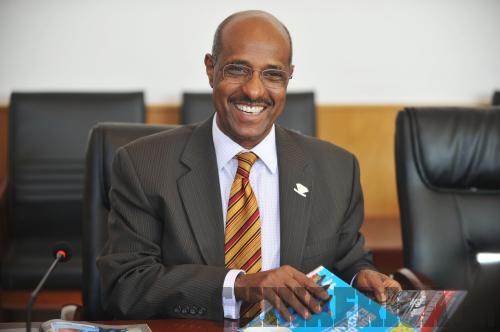 |
|
Seyoum Mesfin, Ambassador of Ethiopia |
» Seyoum Mesfin, Ambassador of Ethiopia: Before we talk about the role of the AU in strengthening African unity, we need to revisit what that unity meant when the OAU was established half a century ago.
When most African countries were under the yoke of colonialism, the Founding Fathers were resolved to establish the OAU to ensure unity and solidarity around African countries and the African people to liberate the continent from colonialism. If we look back into what that unity has contributed to liberating the continent from colonialism, the OAU has successively achieved its objective and goal in liberating the continent from colonial rule, and from the rule of white minorities, including ending apartheid in South Africa. This is a major achievement of the OAU, and may not have been achieved by individual countries.
Africa's unity and solidarity has been instrumental in the liberation of the continent from colonialism and apartheid. But OAU's goal was not limited to liberating the continent from colonialism, it goes beyond dismantling colonial rule and its legacies of injustice, social and economic exploitation and gross violations of human and political rights. That unity also aimed to liberate the African people from poverty and underdevelopment and for promoting their wellbeing. But when we reflect on the latter objective we recognize that a lot remains to be done. It is incumbent on us to reflect not only in the achievements, but also on the future challenges. Democratization of the state and building of institutions of democracy and good governance; promotion of human and people's rights and transforming the political economy of our continent are the daunting challenges lying ahead of us.
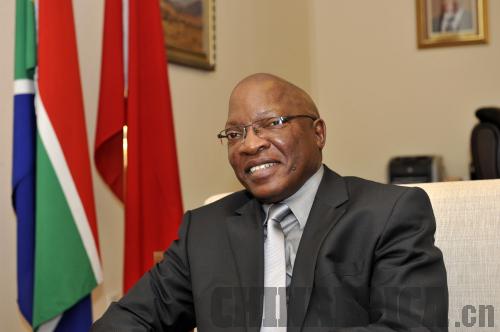 |
|
Bheki Langa, Ambassador of South Africa |
» Bheki Langa, Ambassador of South Africa: The 50th Anniversary provides a unique opportunity to reflect on the progress of and challenges still facing the African continent. This anniversary comes at a moment when Africa is on the rise, as reflected by the fact that Africa is home to six of the 10 fastest growing economies in the world. This has been achieved because of the deep economic and political reforms that have taken place on the continent, spearheaded by the transformed AU with its key interventions through NEPAD and the African Peer Review Mechanism.
As the coordinating body for the continent's political and economic programs, the OAU was instrumental in fostering cohesion, unity and common purpose in otherwise disparate countries with different, but common, challenges related to underdevelopment, poverty and lack of economic infrastructure.
The OAU's transformation into the AU in 2002 has provided the needed impetus toward institutionalizing the necessary reforms to move the continent from what The Economist called the Dark Continent on one of its covers, to what it today recognizes as a Rising Continent. The invigorated AU has been very active in advising member states on appropriate systems for institutionalizing participation in political systems, as well as fostering accountability and responsibility in the leadership of our countries. The last two have been instrumental in ensuring that the leadership works for the people, and not the other way round.
While this vision has been more prominently articulated by a new corps of African leaders, this development also reflects a new consciousness among Africa's intellectuals and other sectors of civil society. The common continental objective is to define a trajectory for Africa to extricate itself from the status of development laggard. The core attributes of such an agenda include: consistent and inclusive democracy; modernization of African productive forces to aid its industrialization and agriculture for food security; development of its human resources and investment in science, technology and innovation; integration, including through infrastructure development and the free movement of people and goods, to grow intra-African trade and investment; and improvement in the socio-economic conditions of African citizens.
Indeed, the start of the new millennium has seen the reawakening of discourse and action on African development and continental renewal.
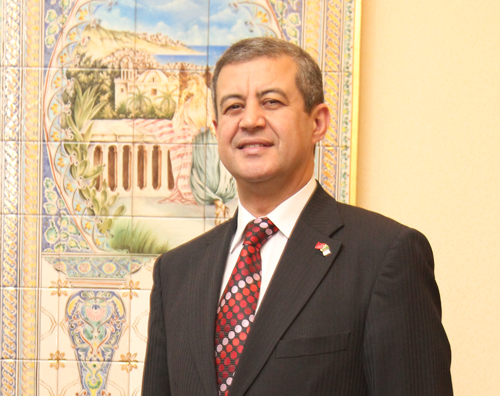 |
|
Hassane Rabehi, Ambassador of Algeria |
» Hassane Rabehi, Ambassador of Algeria: This year Africa will celebrate the 50th anniversary of the formation of the OAU, and the 11 years since the launching of the AU.
During the initial years of the OAU, the emphasis was on "emancipation from foreign domination" and the "sovereignty of member states." Whilst retaining these values, the creation of the AU ushered in a period of added attention to "unity," "solidarity," "non-indifference" and "collective responsibility" in the areas of peace, governance, gender equality, development, human rights, citizen participation and cultural renaissance.
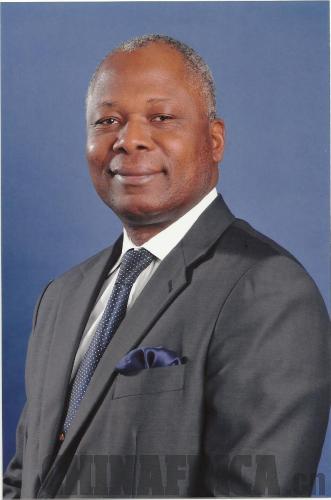 |
|
Martin Mpana, Ambassador of Cameroon |
» Martin Mpana, Ambassador of Cameroon: From my own experience and observations, particularly during 1981-86, when I served as Second and later as First Secretary at the Cameroonian Embassy in Addis Ababa, the role played then by the OAU and now by the AU is pivotal in determining the common objectives stipulated in Article II of the OAU Founding Charter and confirmed in Article III of the Constitutive Act of the African Union. That role is also instrumental in harmonizing African policies in various fields. The AU was strengthened through various decisions and actions, for instance:
- Total liberation of Africa from colonialism and all forms of discrimination, including apartheid;
- Promoting unity and solidarity amongst African states;
- Coordinating and intensifying cooperation and efforts to ensure better living conditions for the peoples of Africa; and
- Defending the sovereignty, territorial integrity and independence of African states.
Many specialized agencies were created by the OAU to deal with specific issues such as sports, health, culture, science, technical cooperation, economic cooperation, etc.
Finally, it's worth mentioning that the OAU/AU is the only African institution that brings together the continent's heads of state, so they can discuss common African issues and make decisions on Africa at the top level. Therefore, the AU plays a crucial role in terms of coordination.
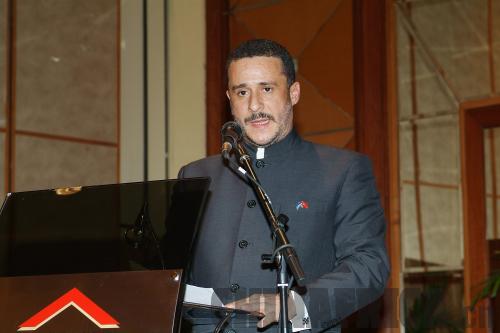 |
|
Julio Morais, Ambassador of Cape Verde |
» Julio Morais, Ambassador of Cape Verde: The OAU, created on May 25, 1963 (three years after the "independence wave" in 1960), tackled the main challenge of promoting the conditions necessary for the inevitable political independence of the whole continent. This huge task was finished in the beginning of the 1990s, with the independence of Namibia and the fall of apartheid in South Africa. For 30 years, this unity was the driving principle used to eradicate colonialism and apartheid from Africa, and it proved its pertinence.
It should be stressed that unity continues to be one of the driving principles of African states' foreign policy, allowing them to act as one global entity in the international arena.
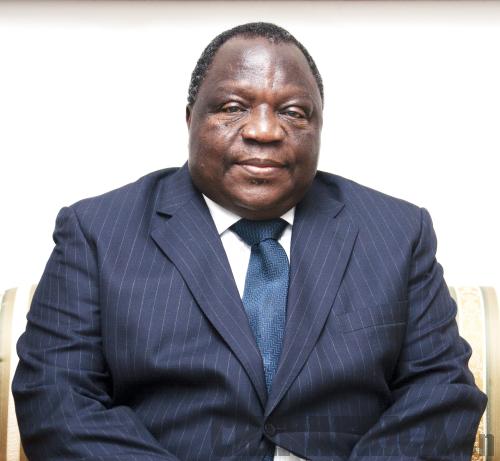 |
|
Nolana Ta Ama, Ambassador of Togo |
Pan-Africanism and Renaissance are the themes of the AU Golden Jubilee. Why are these two issues so important for Africa?
» Seyoum Mesfin: Yes, they are so important, because they are eternal flame of the African people. Pan-Africanism, the call for unity and solidarity has its roots in the struggle against slavery, colonialism and racial discrimination by Africans in the continent and Africans in the diaspora including those in North America and the Caribbean islands. The slave revolution that established an independent nation of Haiti in 1804, the first black-led republic in the world, the New Negro movement led by Marcus Garvey in Jamaica, the United States and later in Britain and the victory of Adwa by Ethiopia in 1889 over a modern European army successfully defending her sovereign independence are some of the glorious chapters in the history of struggle on Pan-Africanism. The Founding Fathers of the OAU raised the banner of Pan-Africanism in early 1960s with the objectives of promoting unity and solidarity to eradicate all forms of colonialism, to promote international cooperation and to achieve better life for the peoples of Africa. These objectives of Pan-Africanism have been relevant in the past; they are relevant today, and will remain to be so in the future.
Secondly, the African Renaissance aims to reflect on the assets of the African people and to empower them to shape their destiny. Africa is the cradle of humanity and of many glorious civilizations of rich and diverse culture. Africa is endowed with immense natural and human resources. Hence, the struggle for the Renaissance of Africa is to transform Africa into a global growth pole, to build one Africa on the basis of unity in diversity, and to see Africa which is prosperous and peaceful. These are some of the salient features which make Pan-Africanism and African Renaissance eternal.
|